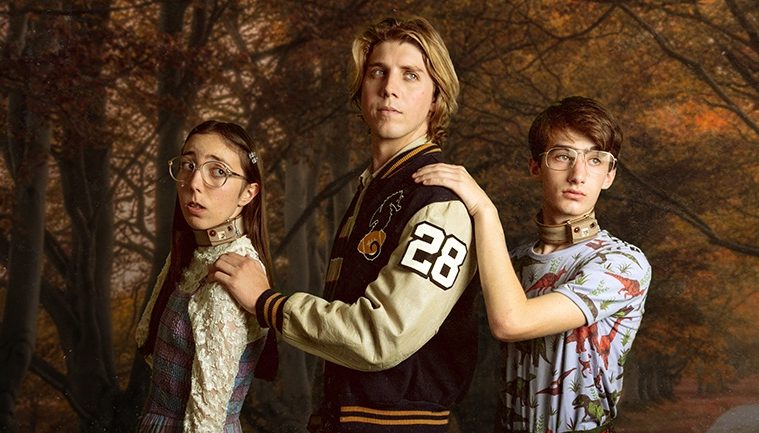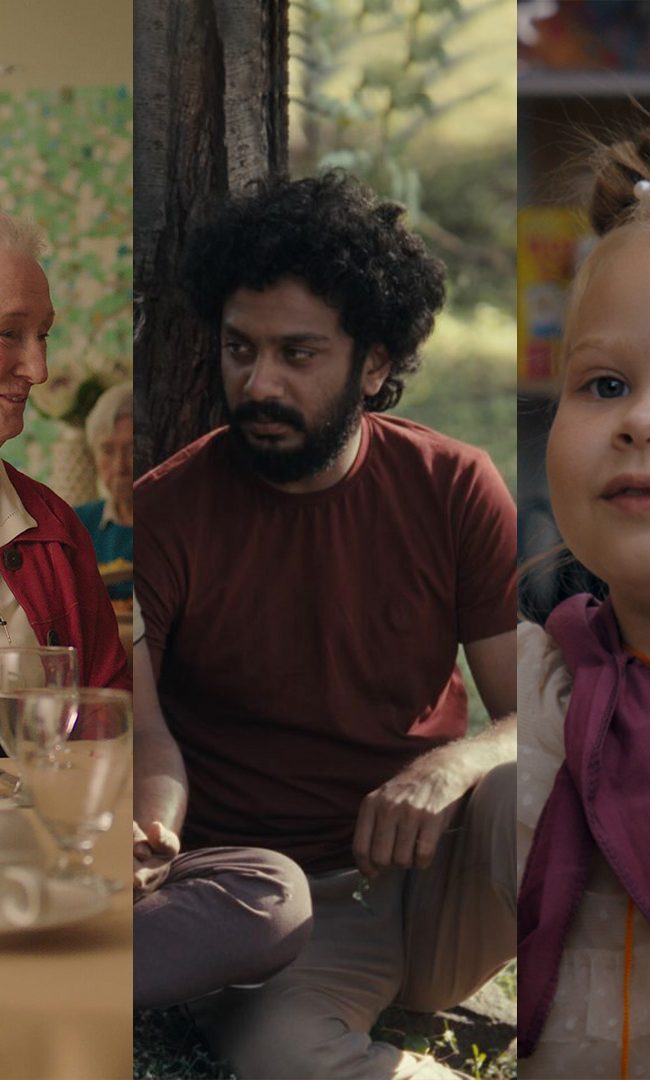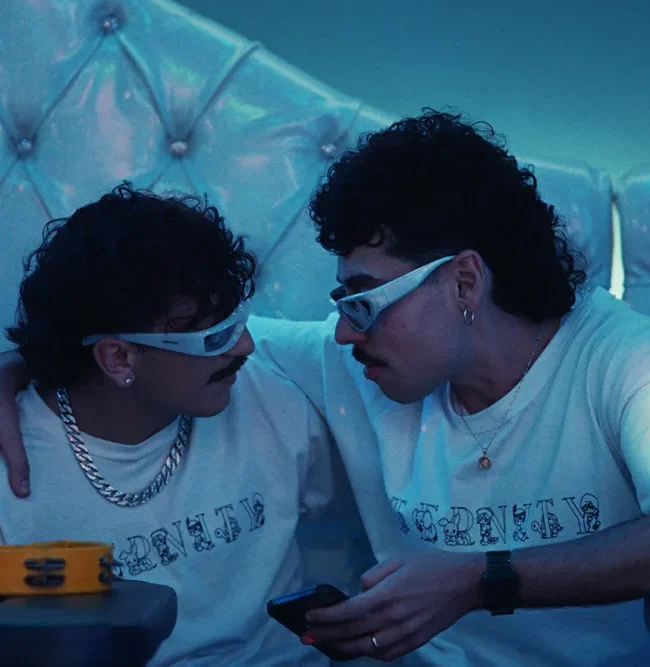
(Christopher Winterbauer’s feature debut, Wyrm, is still making the rounds at film festivals, most recently at the San Francisco International Film Fest. Like what you see here on Hammer to Nail? Why not pay just $1.00 per month via Patreon to help keep us going?)
It’s difficult to impart a sense of Christopher Winterbauer’s feature debut, Wyrm without making it sound like a bit of a drag. The films’ own synopsis compares it to Yorgos Lanthimos (presumably The Lobster) and Todd Solondz, (presumably Welcome to the Dollhouse). The film also lends itself to comparisons to Napoleon Dynamite, but again, this is unfair. Winterbauer’s film, based on his 2017 short, isn’t nearly as nihilistic as Lanthimos or Solondz, and it’s much more nuanced than Jared Hess’ breakout smash. On its face, the script is about the mortifying awkwardness and quiet indignity of junior high sexuality, but underneath, it’s a poignant exploration of grief and the myriad ways it manifests.
Wyrm (Theo Taplitz) is the unfortunately-monikered titular protagonist and his origin story is tragic. Born with a heart condition, he is the latest of bloomers, and literally the last kid in his 8th grade class to complete his Level 1 Sexuality Requirement. Until he’s kissed by a willing romantic partner, Wyrm must don a bulky, chafing collar around his neck, telegraphing his predicament to everyone he encounters. His twin sister, Myrcella (Azure Brandi), was once his closest confidant. But now that she’s “popped her collar,” she wants nothing to do with him and is even angling for her own room.
Adding to Wyrm’s sense of displacement and lack of direction is the recent death of his popular older brother, who crashed a car, leaving his girlfriend paralyzed from the waist down. Wyrm carries around a tape recorder, collecting statements from everyone he encounters who knew his brother. Many manage to craft flattering sentiments, but it’s clear they’re struggling to find the words. Rhea Seehorn (TVs Better Call Saul) has a particularly funny cameo as a pediatrician. The only thing she can say about the deceased is that he was pretty hairy for a boy his age.
At one point, an authority figure says, “Lonely children are dangerous. Especially lonely boys.” But their older brother was a popular early bloomer, and he’s the one who caused a fatal car accident. Myrcella insists that their brother was an asshole and is upset that no one will acknowledge this now that he’s dead. Nonetheless, Wyrm claims to miss his brother and obsesses over the audio collage.
Meanwhile, Myrcella deals with her complicated feelings by sending anonymous “truth telling” letters to people at school, and signing them, “I hope the truth finds you well.” The script shows tremendous empathy for all the characters, including the twins’ mother (Rosemarie Dewitt), and even Uncle Chet’s girlfriend, who initially comes off as an opportunist.
Myrcella and Wyrm have also lost their parents, in a way, because their father is always at work or in the bathroom suffering from constipation, and their mother is allegedly finding herself on a thousand plus mile trek. Uncle Chet (Tommy Dewey) has moved in to help keep the house in order while their parents are indisposed, but he’s ill-equipped to deal with the teen angst.
Izzy (an inspired Lulu Wilson) is the confident but eccentric girl with a pronounced birthmark on her cheek who catches Wyrm’s eye. She’s not exactly sweet to him but she talks to him and doesn’t make fun of him. Izzy exudes pathos and shares her hobby of taking photos of empty rooms with Wyrm. In a particularly heartbreaking scene, Izzy invites Wyrm to accompany her to dinner at a divey hotel with her deadbeat dad and step-mom. She might not LIKE like Wyrm, but she trusts him enough to let him into this uncomfortable aspect of her life. The film might be named after Taplitz’s character, but Brandi and Wilson also get several opportunities to showcase their wonderfully holistic talents.
Winterbauer’s world is an early 90’s parallel universe (complete with burgeoning internet), wherein society revolves around “No Child Left Behind”, a program designed to prevent children from missing out on what they’ve deemed age-appropriate sexual milestones. After the first kiss collar comes the bracelet, attached at the end of 8th grade, which releases upon loss of virginity. They don’t specify what this entails, but it’s not that kind of movie, really. Wyrm doesn’t get bogged down in the details. It relays just enough information through contextual exposition and signage to give the viewer a feel for what it’s like to live like this. One assumes these measures were put in place in order to prevent angry virgins from shooting up a school. We don’t know how effective it’s been. But the junior high caste system seems firmly in place, and at one point, Wyrm shares a knowing look with a still-collared middle-aged janitor. “Not too early, not too late,” is the ideology the principal shares, in a fun bit of commentary on society’s tendency to micromanage a child’s sexual journey.
The beige and neon color palettes of the early 90s are on display, as are unflattering clothes, side ponies, chunky glasses, and high waist lines. Enormous computer monitors engulf desktops. Wyrm assembles his audio collage on an enormous sound system. But all this retro Mise-en-scène feels lived in, rather than gimmicky. In a particularly profound exchange, Wyrm’s guidance counselor asks him if he’s seen the internet. When Wyrm shakes his head, the man explains, “It’s everything.”
The undercurrent of Wyrm is the refreshing notion that it’s OK to feel your feelings. It’s OK to be sad about missing someone who died. It’s OK to not be sad about it. It’s OK to not be ready for age-appropriate milestones. It’s OK to be ready early. This film posits that there’s really no wrong way to grieve or grow up and that everyone processes loss and trauma in their own way and in their own time.
Once again, it sounds like a drag, but I promise it’s not. Wyrm is amusing and heartfelt and I recommend it to anyone who likes quirky films about sad people. I would say that Christopher Winterbaeur is more Spike Jonze-ey than Yorgos Lanthimosian; more Michel Gondry-esque than Jared Hess-ish; more Miranda July than Todd Solondz. Here’s hoping Winterbauer keeps making films like this, so he can become an adjective of his very own.
– Jessica Baxter (@tehBaxter)











